Tourist privilege couldn’t be clearer, yet it’s something we travelers often overlook. Let’s not.
“The child is very malnourished,” the old doctor said matter-of-factly, examining a limp boy with a stethoscope for an apathetic half second. He surveyed him through dim light from a single bulb, flickering in his office inside a crumbling rural hospital in Bangladesh.
The patient’s mother, swathed in a black abaya and yellow floral hijab, clutched the boy to her. A square of black cloth hid her face. Only her eyes were visible, glinting attentively as she watched the doctor scratch names on a prescription pad. After a short exchange in their local dialect, she stood and carried the boy out of the office, prescription in hand.
“What did you prescribe him, then?” I asked the doctor once she left. Conversation covered my awkward discomfort. Brought there by my local host to meet the English-speaking doctor—conversational English is rare in rural Bangladesh—I’d watched the scene play out from across his desk.
“A few things.” His eyes, shielded by glasses, pointed ever so slightly in two different directions. “I say the boy needs to eat more nutritious foods. He only eats biscuits and sweets. But she just wants medicine, so I prescribe medicine to make her happy.”
“Nutritious foods? Like what… fish or vegetables? There are many on this isla-”
“No, like more oily foods,” he cuts me off impatiently, as if it’s the most obvious thing in the world.
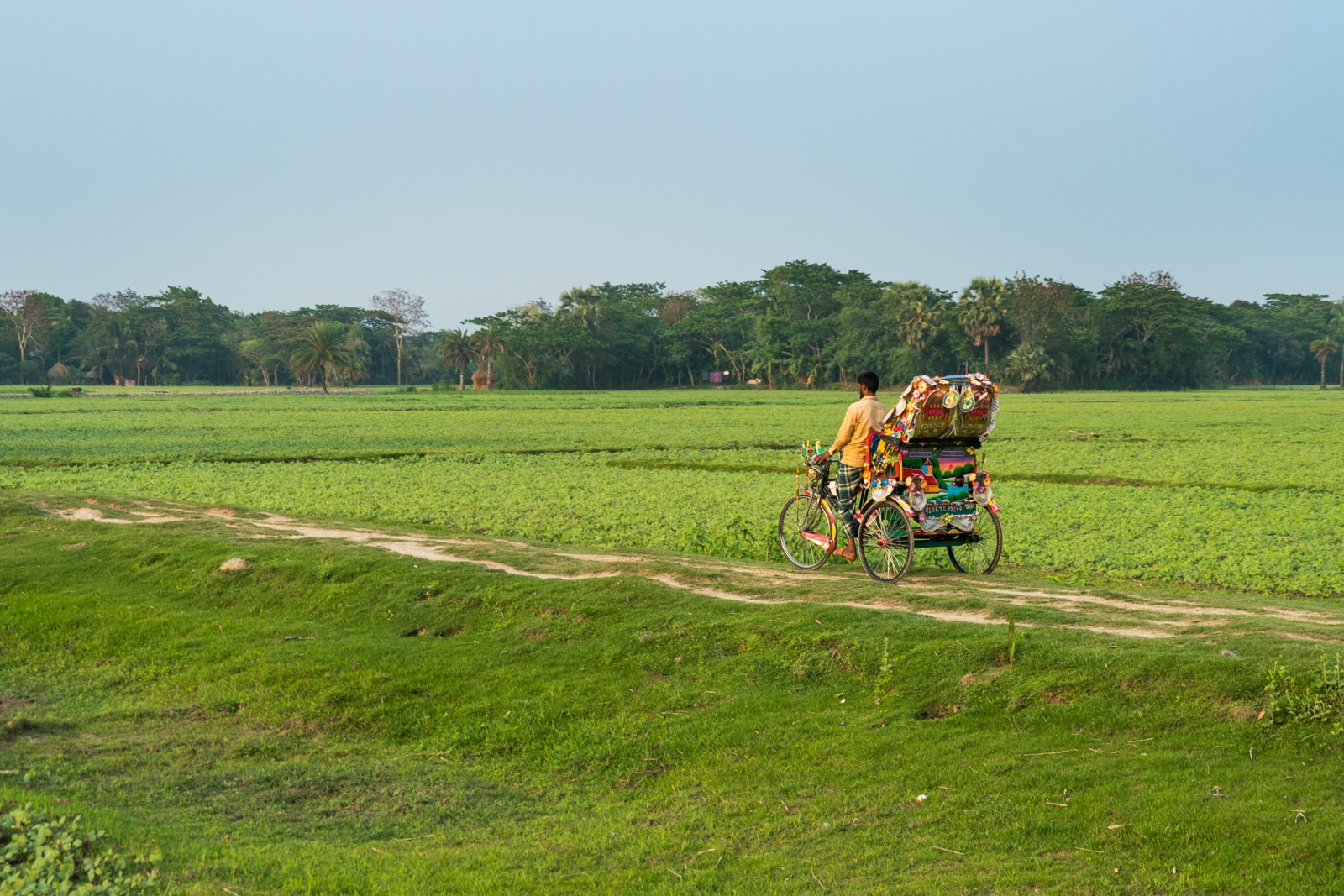
Welcome to Monpura, Bangladesh
Why are you here?
Our exchange took place on Monpura, one of many islands at the intersection of the Meghna River and the Bay of Bengal in Bangladesh.
One week before, I had no inkling of the island’s existence. An article offhandedly mentioning Monpura’s lush natural beauty and lack of tourists was enough to draw me to its shores. As a lover of “off the beaten track” destinations, visiting Monpura was an obvious choice… but the locals I met once there were dubious about my decision.
“Why have you come to Monpura?” the doctor asked me from behind his desk. As I gave a pageant-worthy spiel about natural beauty and kind people, he nodded slowly, leaning back.
“Yes. I suppose for you, a tourist, it is a very beautiful place. But for the people of Monpura, life is very hard. There are no facilities.
I want to leave, but I cannot find anyone to replace me. No one wants to live here.”
Understandable. A devastating cyclone killed tens of thousands of people and destroyed most of Monpura in 1970; the island is still recovering. Overwhelmingly poor and farmers and fishermen make up most of the island’s population. The literacy rate is around 35%. Many live in corrugated tin houses; even middle class concrete houses I visited had dirt floor kitchens with holes in the ground for stoves.
Yet there I was, an ignorant foreign girl chirping happily about the richness of pretty roads lined with banana trees and friendly locals.
Late that night, after visiting the hospital, I lied wide awake in bed, staring up at mosquitoes whining and circling the netting over my bed.
What was I doing there?
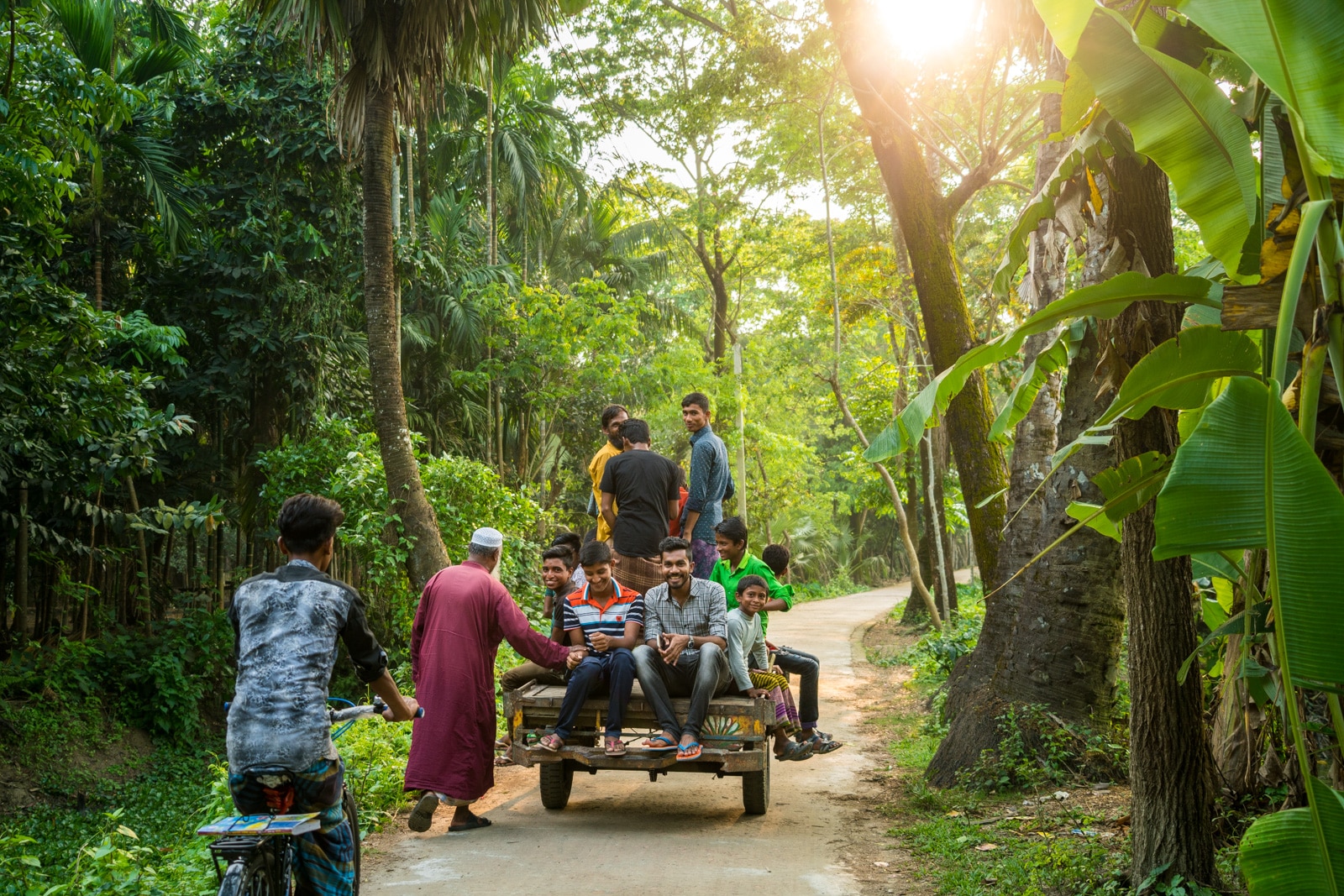
For the record, Monpura is damn beautiful.
Voyeur voyage
The interaction haunted my thoughts for weeks. Years later, I can still hear the doctor asking his simple question.
Was I really an innocent tourist? Or was I some kind of freakish voyeur, subconsciously feeding on the suffering of others? A dark tourist using those less fortunate to stroke my adventure ego and satisfy morbid curiosities?
I began to doubt my travels. My interests. My intentions. The life I’ve created for myself.
I began scrutinizing everything I did, from the way I spoke to chai vendors to how I chose my next destinations. Critical ears dissected traveler conversations about countries visited, paradises found, journeys undertaken. Wondering why was a part of every process, whether I was opting for convenience store ice cream or diving through seas of taxi hawkers.
Why am I driven to travel as far from home as possible?
What draws us privileged travelers to developing countries?
Is it wrong for me to want to be here?
I found no concrete answers, only more questions.
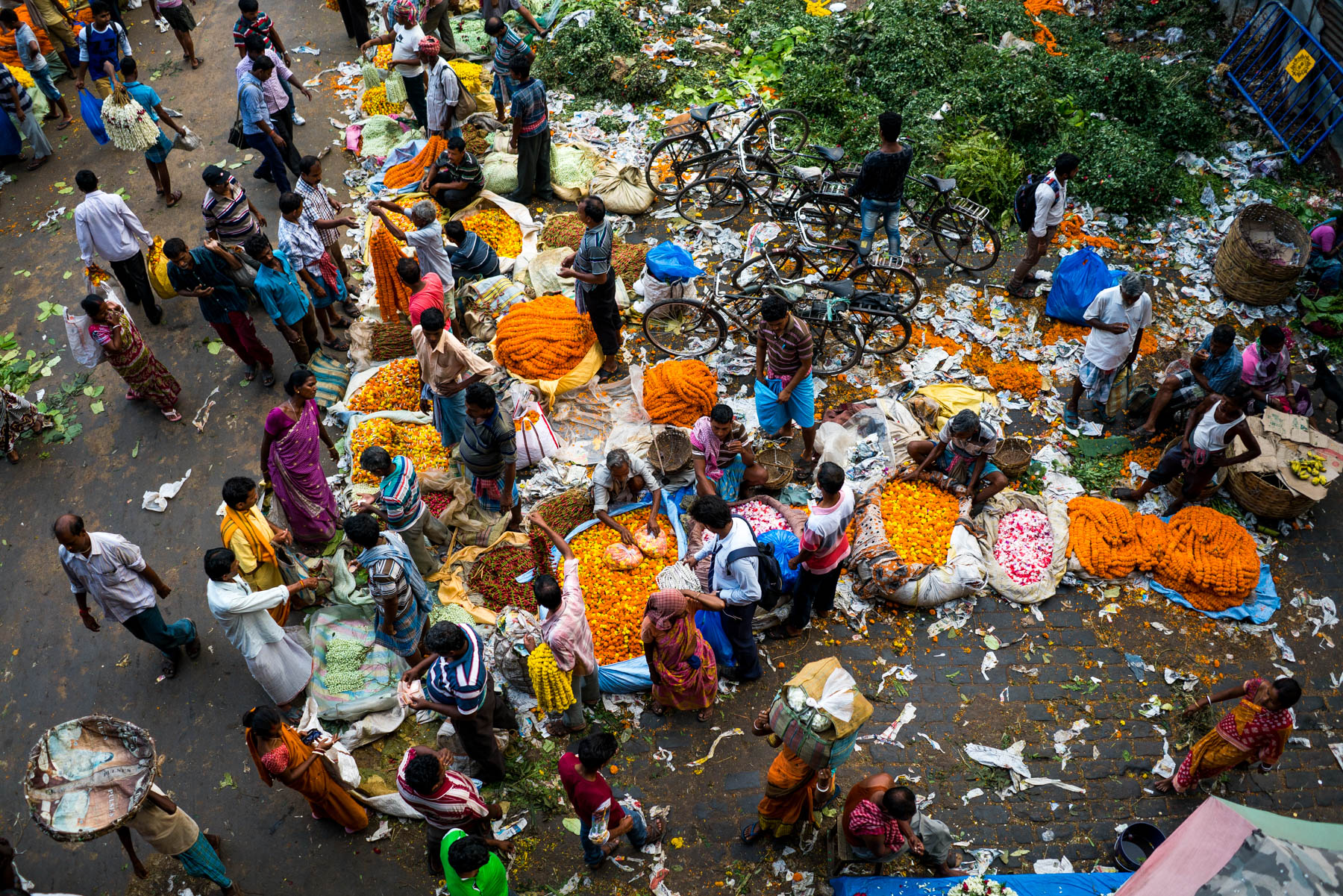
What is it that draws travelers from developed countries to always seek out scenes like this flower market in Kolkata, India?
Dual perspectives
A year and a half later, I came full-circle with a woman on the side of a dusty road in Khorog, capital of Tajikistan’s Pamir region.
“Now you know what it’s like to live in Tajikistan,” the young woman said. Long auburn hair pulled into a bun accentuated the strain in her face as she surveyed the main road, quiet on a Sunday morning. She needed to go west, I needed to go east, but we both stood waiting for cars that might never come.
“I want to spend time with my mother in Bartang before I must go back to my study in Germany,” she said, her voice trembling anxiously, “but I do not have much time. Only a few days. I need to go today.” She glanced up hopefully at a white van slowing to stop near us. False alarm—just a passing local minibus.
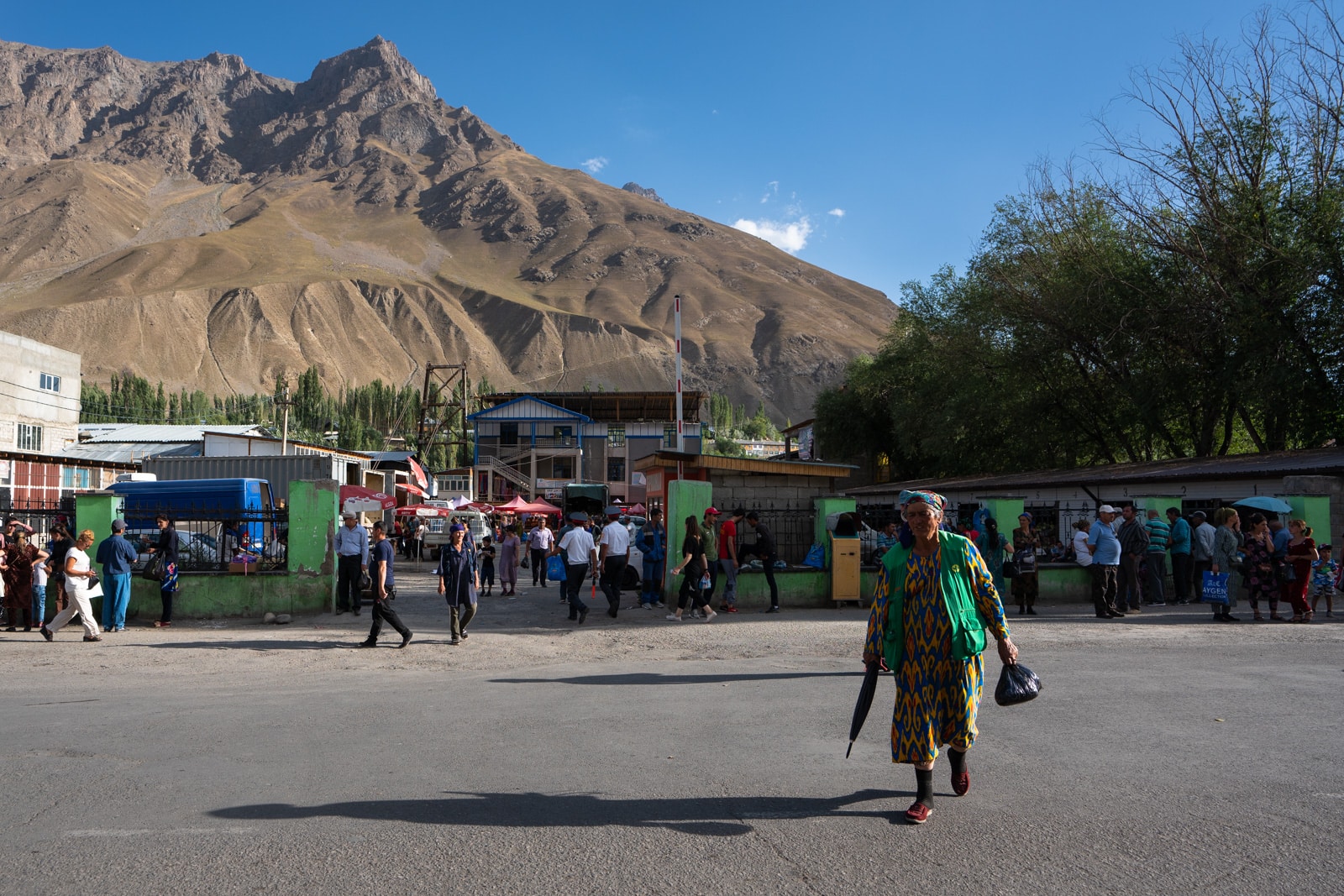
Khorog’s main street on a busier weekday
“It is very difficult to live in Tajikistan,” she continued. “There are no schedules, not enough transport, not enough food or work. It is very beautiful place to visit for people like you, but for us it is a very hard life.”
I nodded. “It’s true. We tourists can visit and enjoy the mountains, but when things get too difficult or tiring for us, we can leave.” I was all too familiar with the duality by then. “I understand not everyone has that privilege.” I thought about adding an apology, but it seemed condescending; I bit my tongue.
The Tajik woman sighed in defeat, looking out at the sparsely populated road.
“Germany is very different. From living and studying there, I now understand how hard life is here in Tajikistan.”
Our conversation continued down this downhill path for a time, until it was interrupted by opportunity: a driver looking for passengers to my destination.
Saying goodbye and wishing her luck, I went my way; the last I saw of the woman was her floral black kurta, fluttering as she dashed toward a car that might have been heading in her direction.
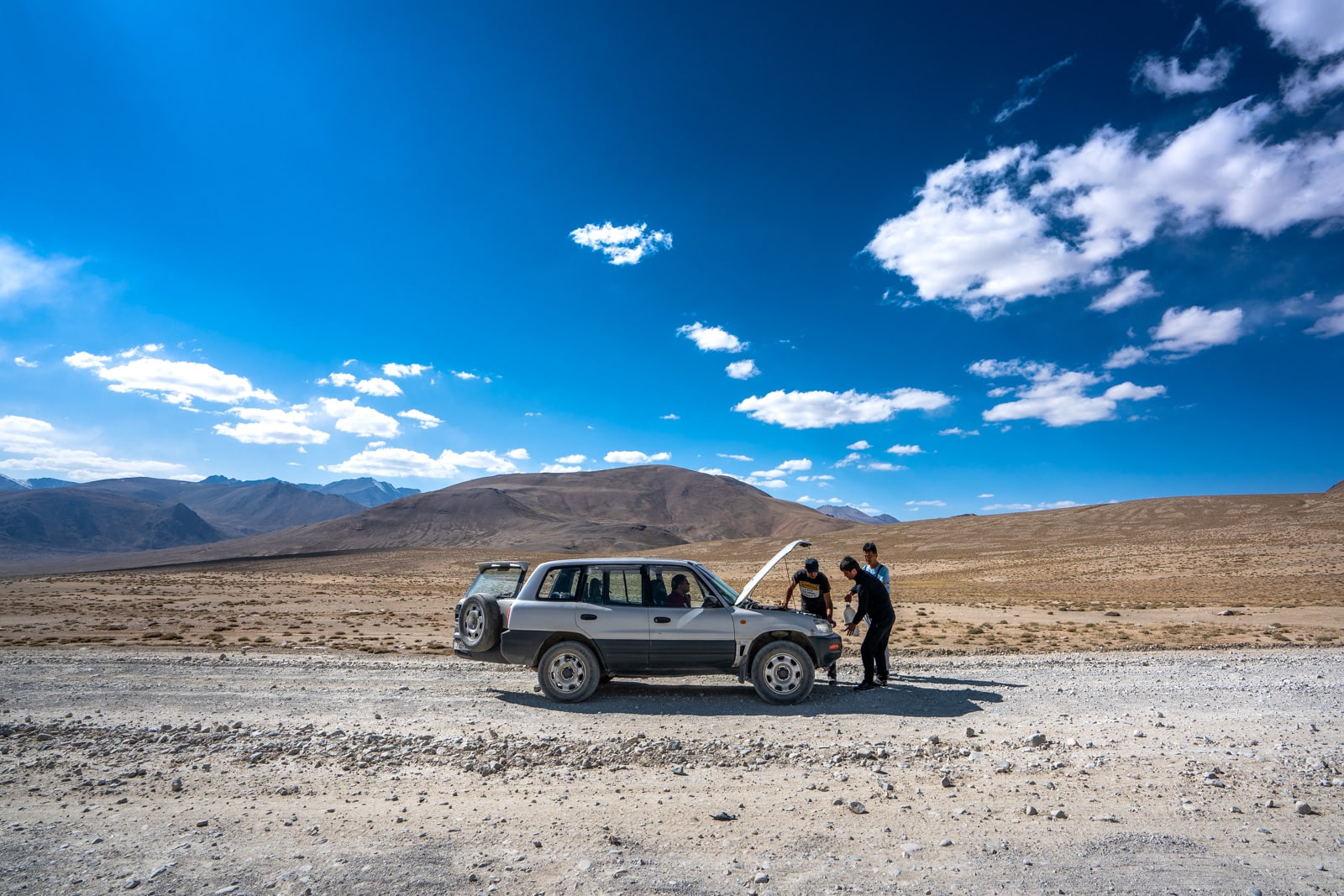
The shared taxi having a bit of a breakdown—the first of many—en route
Privilege in the Pamir
The shared taxi crawled along the dusty Pamir Highway as I sifted through thoughts. They transported me back to my Monpura bed: pondering privilege as I sought adventure in a remote region of the world. This time, the whine of hungry mosquitoes was replaced with the tired taxi’s groan as it climbed mountain passes.
My brain conjured an image of the Tajik girl sitting with the doctor behind his desk, eyes boring into me as I gazed unseeingly at desolate high altitude landscapes. Why are you here? Why did you come to this difficult land?
My thoughts flitted, reflecting on all the “difficult” places I had visited and glamorized in my previous three years of travels. All the times my privilege as a foreign tourist was painfully obvious, yet unnoticed by me:
Sipping tea in Afghanistan as people shared stories of friends lost to bombings and financial hardships from war, knowing I’d fly away mere days later.
Haggling over costs of a bicycle so I could cycle around another remote Bangladeshi island alone—something most local girls would not be allowed to do.
Assuring villagers in Pakistan’s mountains they live in paradise one sunny summer afternoon, though I’d never lived through a harsh winter with limited supplies, restricted road access, and scarce heating.
Hmm.
It’s easy to don rose-colored glasses and declare a place paradise when you’re on holiday, unburdened by any of the realities of life there. But as I took my mental step back and attempted to remove my glasses, I found it disturbing that this had not really occurred to me earlier.
Pretentious people spend a lot of time trying to differentiate between tourists and travelers. Normally I try to avoid the semantic discussion, but in that moment, the debate seemed more absurd than ever before. Traveler, tourist, it doesn’t matter—what does matter is that both “travelers” and “tourists” alike have the freedom and means to move simply because we want to.
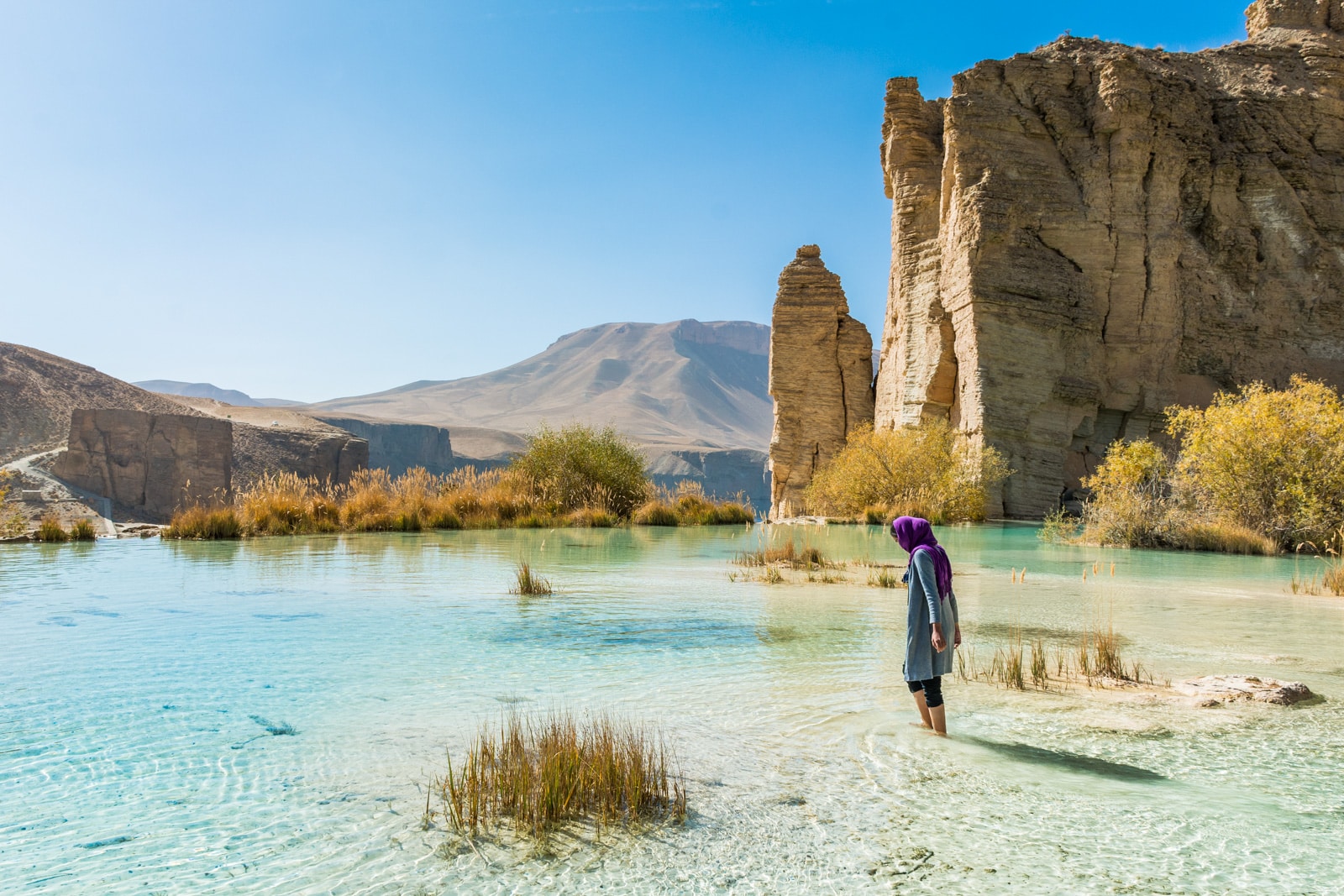
Enjoying the striking Band-e Amir lakes in Afghanistan because I chose to, not because that’s all I can access.
Apocalypse astounds me
Maybe it’s a stretch, but in Apocalypse 2020, I find the discussion more relevant now than ever before.
In the span of a few weeks, coronavirus completely changed the world as we knew it. As countries closed, and reports began to roll in about the risks of the virus and its potential dangers to our societies, another discussion emerged: the ethics of traveling in a pandemic era.
I watched as (often) Western influencers continued travels in developing countries, despite overwhelming amounts of information illustrating how irresponsible travel was at the time. Decisions like this are easy when you know if anything truly bad happened to you, you can be whisked away to safer pastures and better infrastructure, or afford in-country treatment… possibly at the expense of a less-privileged local in need.
Other Western travelers purposefully carried on with their planned vacations, getting aggressively defensive when others questioned their decisions. They paid the money, they made their plans—they had a right to their vacation, even though they were putting others at risk by traveling and potentially spreading the virus.
The entitlement was appalling. The ignorance or disregard for locals’ safety, disturbing.
Lockdown has given me the space to sit and think without distractions… and finally, more than two years after my discussion with the doctor, I’ve found order for my thoughts.
Tourist privilege: the freedom to be curious
In my opinion, it’s not wrong to travel to “far-flung” places. To seek a nuanced perspective in a country you only know from news headlines. To find beauty in a slower pace of life, even one burdened with hardships. To immerse yourself in environments completely foreign to you.
For (hopefully) many of us tourists, these desires stem from something innocent: curiosity. A desire to experience places that challenge our understanding of the way life works. A chance to broaden our perspective about our species, its myriad cultures, and the planet that hosts us.
The issue with this curiosity is that we often feel entitled to exercise it. The freedom to satiate it is taken for granted. In this day and age, many tourists view travel as a right, not a privilege.
If you’re reading this, you’re privileged enough to be highly educated and speak English. You can afford smart devices, data, and/or a WiFi connection. Your life is stable enough that you have time to sit and read some random girl’s blog posts online. Even if your passport, finances, or circumstances restrict your travels, chances are you still have the privilege of choosing where you live or go to some extent.
Don’t feel guilty about it. Foundations of privilege are out of our control, laid over centuries of discrimination and biased systems. The problem is when we don’t acknowledge its existence, or deny we benefit from our own. We can’t work toward equality if we’re embarrassed to admit inequality exists in the first place.
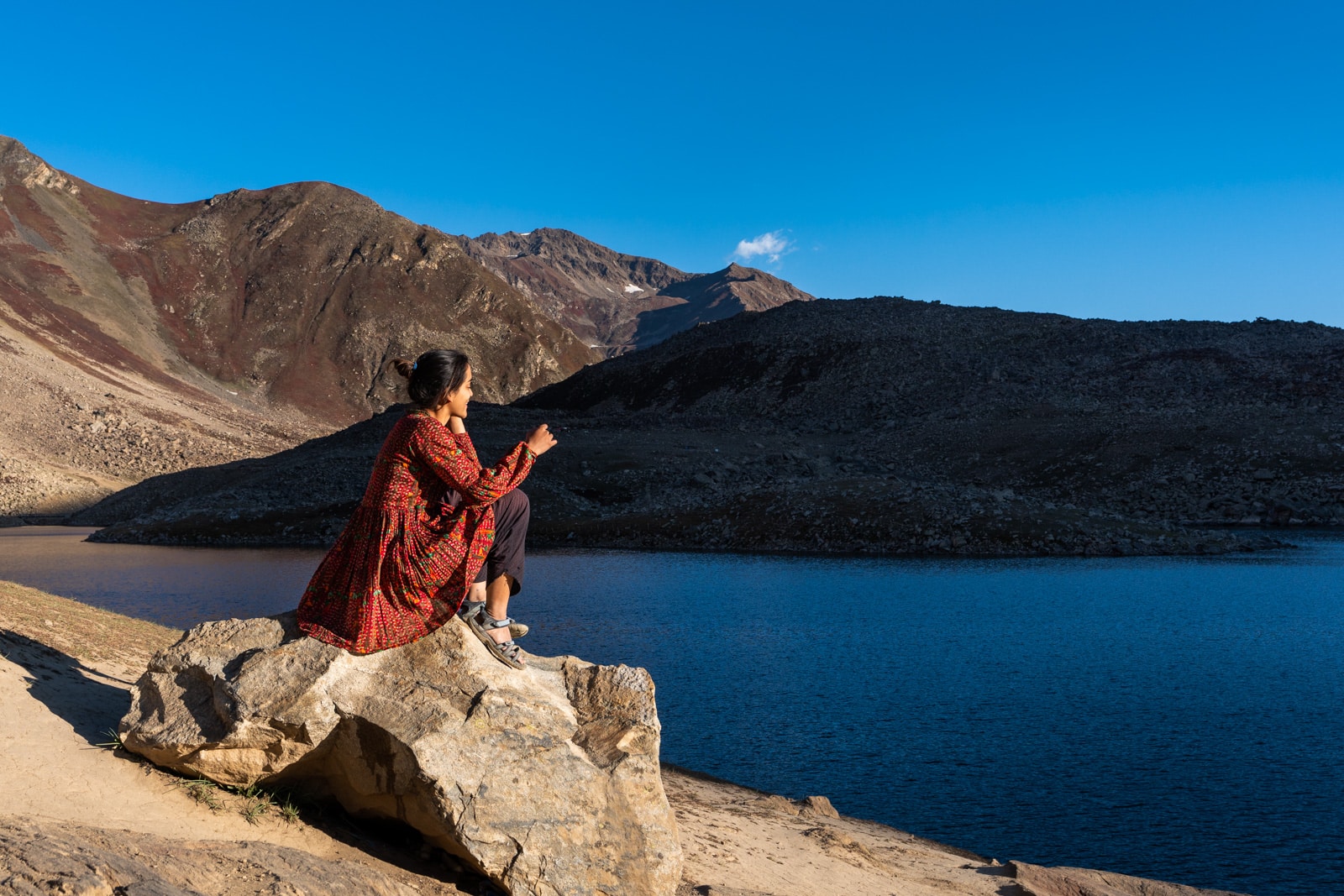
Pondering place at Pakistan’s Lulusar Lake
Dreams of paradise
I’m not trying to ruin your bucket list or undermine your travels. By all means, continue to dream of traveling the Silk Road, or sequestering yourself on remote islands, or finding peace in village life. I’m right there dreaming with you.
All I’m sayin’ is: check yo’ self.
As (again hopefully) aspiring responsible travelers, we all need to look and think more deeply about the places we visit. Why we want to visit? How should we act when we arrive? What can we do to ensure our impact is positive?
Part of traveling responsibly is recognizing that we’re privileged to be able to travel at all, and not abusing our privilege. Instead, we should find ways to use our privilege to empower those who are less so. (No, giving handouts does not count.)
Go forth and travel. Just don’t forget that you, the tourist, have the privilege to visit a destination, skim its surface, perceive it as paradise… then leave when paradise gets old or times get tough. Locals often cannot.
Even in purported paradise, there’s always more going on under the surface than meets the eye. Especially in dreams.
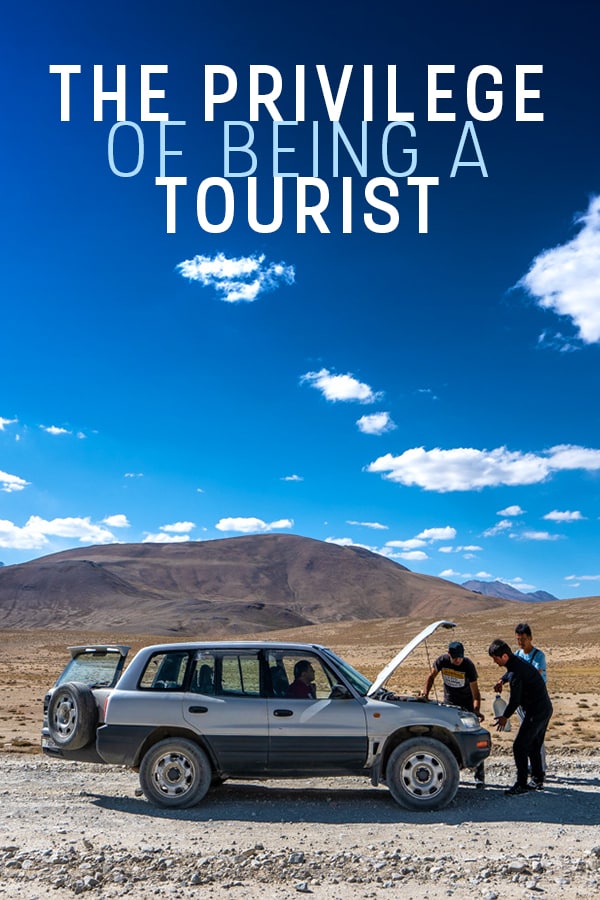
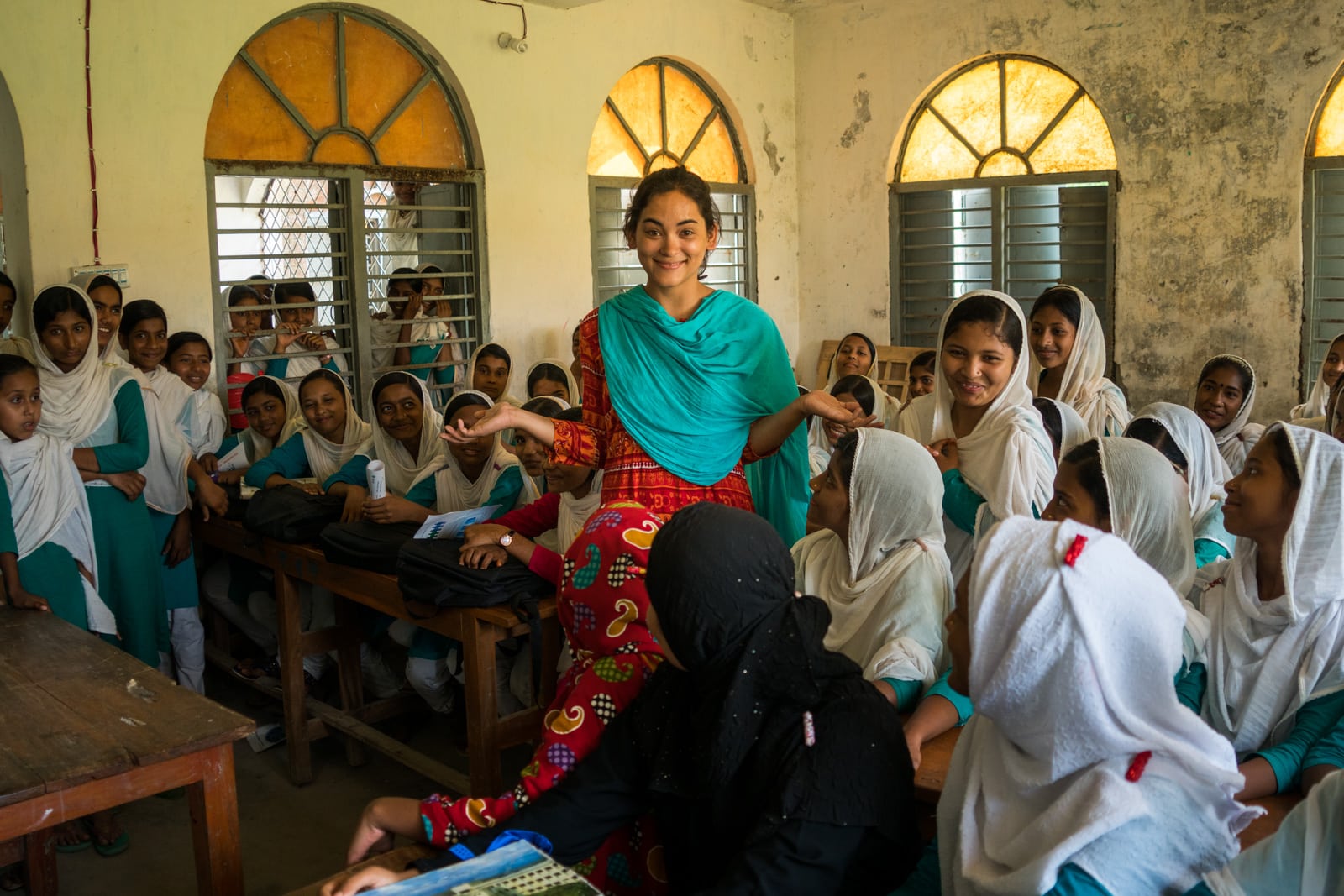


Well I have been to Afghanistan, Nepal and parts of India most Indians would never ever get to see. But you’ve seen parts I will never see. Envy you. God bless.
You’ve been to all those countries already… perhaps you’ll get there, too 🙂
Thank you for writing this. It’s not something we don’t know of or have heard of but we don’t really ponder over these thoughts and reflect over our privileges and travel styles. I’ll definitely think more about it during this time of lockdown.
Precisely! Many of us are loosely aware of it, but never really take the time to think about it… it’s easy to get distracted by all of the beauty we find on the surface.
So honest and eloquent. Maybe my favourite out of all hour excellent posts. I’m going to share this with anyone that asks me about traveling.
Thank you Anita 🙂 I’m glad my words made sense!
Travelling to less developed or poor countries helps me to realise how privileged I am to have my own small flat (rented), with working heating in winter, food supplies, freedom of religion, freedom of wearing the clothes that I like. I think, if you don’t see and experience those things (even if it’s for a short time), you underestimate your privileges.
It’s true! Even without travel, there are so many little things that are easy to take for granted.
Love this piece, Alex! I’ve also been turning over pieces of this in my mind for a while now, especially when I backpacked through SE Asia last year.
If you’re interested, I wrote a piece on my (small) blog about what it means to find “authentic” experiences while traveling that touches on some topics you discussed. It’s certainly not as eloquent as your post, but I hope you find it interesting and/or relevant.
http://www.bananacrossing.com/2018/11/24/on-authenticity/
Not eloquent? Please. I loved your post! You’re a fantastic writer and you captured the critical feeling so well. (I also laughed out loud at ‘I returned to my hostel and promptly googled “is Ubud for real”’) This is definitely relevant, and I can hard relate. I would’ve left this as a comment on your blog but I don’t see a place to leave comments…? Anyway, thank you for sharing this!
Something to ponder upon while we sit at home sipping our tea and plan the next journey. Traveller privilege is a bitter truth. Thank you for voicing it so well!
It’s true. I think of it in that same situation often—missing travel as I sip my drink, then realizing I’m in a very privileged position to have that as one of my biggest woes right now.
Alex, I have been following you on insta for a while. I commend you for being brave to be your authentic self. It’s truly refreshing. This blog was brilliant. In my opinion the key to personal growth and contentment is being self-aware, or, as you aptly put it, “check yo’self” :).
Your summation was perfect. Privilege e is something to be grateful for but at the same time use it to empower others.
I look forward to following your future insights.
Best
Jalal Khan – Sydney
Thank you for the kind words. Agreed that being self-aware is very important in many walks of life. How can we grow if we’re not aware, if we don’t periodically reflect on who we are and what we’re doing?
Loved this post and it’s definitely an uncomfortable idea that I struggle with internally.
Gratitude, privilege, entitlement, self-awareness, gawking / zoo-like behaviour, respecting how people live.
Those are some of the things I have to think about when travelling in poorer areas.
Definitely. The zoo treatment of locals in many, many places is an aspect of the travel industry I find quite disturbing. I wonder sometimes what, if anything, is the difference between visiting a “poor” area (for lack of a better classification) with respect and treating it as a zoo exhibit. Is it even possible?
Thank you for this post. You expressed eloquently why I feel so uncomfortable when I hear people say that they saw the ‘real and authentic’ side of a country because they visited its poorest regions or went on some version of slum tourism. As if authenticity is somehow measured by poverty! I hate it when tourists wax lyrical about locals being ‘poor, but happy’ while ignoring the obvious: That the same locals would be happier if they had food, security and freedom.
Oh man, I groan every time I hear people say that, too. “They’re so poor, but they’re so happy!” How do you know? Pretty sure those people would jump at the opportunity to have a stable and comfortable income in about -0.02 seconds. Comments like that make me wonder if travel really does open people’s eyes as much as we like to think…
This is wonderfully written. Thank you so much for writing about an important and often overlooked topic.
Just trying to express my thoughts! Thank you 🙂